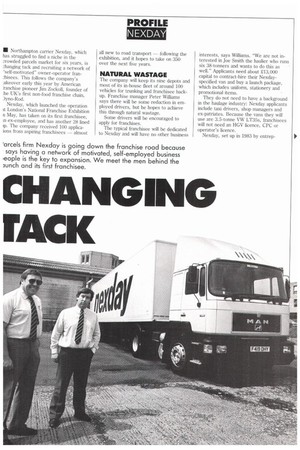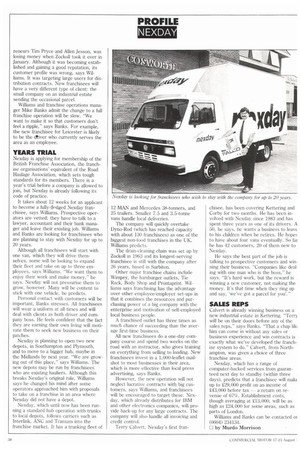CHANGING TACK
Page 39

Page 40

If you've noticed an error in this article please click here to report it so we can fix it.
I Northampton carrier Nexday, which las struggled to find a niche in the :rowded parcels market for six years, is :hanging tack and recruiting a network of 'self-motivated" owner-operator (ran:hisees. This follows the company's lakeover early this year by American ianchise pioneer Jim Zockoll, founder of he UK's first non-food franchise chain, )yno-Rod.
Nexday, which launched the operation it London's National Franchise Exhibition n May, has taken on its first franchisee, in ex-employee, and has another 28 lined 'I). The company received 100 applicaions from aspiring franchisees — almost
all new to road transport — following the exhibition, and it hopes to take on 350 over the next five years.
NATURAL WASTAGE
The company will keep its nine depots and most of its in-house fleet of around 100 vehicles for trunking and franchisee backup. Franchise manager Peter Williams says there will be some reduction in employed drivers, but he hopes to achieve this through natural wastage.
Some drivers will be encouraged to apply for franchises.
The typical franchisee will be dedicated to Nexday and will have no other business interests, says Williams. "We are not interested in Joe Smith the haulier who runs six 38-tonners and wants to do this as • well." Applicants need about £13,000 capital to contract-hire their Nexdayspecified van and buy a launch package, which includes uniform, stationery and promotional items.
They do not need to have a background in the haulage industry: Nexday applicants include taxi drivers, shop managers and ex-patriates. Because the vans they will use are 3.5-tonne VW LT35s, franchisees will not need an HGV licence, CPC or operator's licence.
Nexday, set up in 1983 by entrep
reneurs Tim Pryce and Allen Jesson, was losing money when Zockoll took it over in January. Although it was becoming established and gaining a good reputation, its customer profile was wrong, says Williams. It was targeting large users for distribution contracts. New franchisees will have a very different type of client: the small company on an industrial estate sending the occasional parcel.
Williams and franchise operations manager Mike Banks admit the change to a full franchise operation will be slow. "We want to make it so that customers don't feel a ripple," says Banks. For example, the new franchisee for Leicester is likely to be the diver who currently serves the area as an employee.
YEARS TRIAL
Nexday is applying for membership of the British Franchise Association, the franchise organisations' equivalent of the Road Haulage Association, which sets tough standards for its members. There is a year's trial before a company is allowed to join, but Nexday is already following its code of practice.
It takes about 12 weeks for an applicant to become a fully-fledged Nexday franchisee, says Williams. Prospective operators are vetted: they have to talk to a lawyer, accountant and their bank manager and leave their existing job. Williams and Banks are looking for franchisees who are planning to stay with Nexday for up to 20 years.
Although all franchisees will start with one van, which they will drive themselves, some will be looking to expand their fleet and take on up to three employees, says Williams. "We want them to enjoy their work and make money," he says. Nexday will not pressurise them to grow, however. Many will be content to stick with one vehicle, he predicts.
Personal contact with customers will be important, Banks stresses. All franchisees will wear a uniform at all times and will deal with clients as both driver and company boss. He feels confident that the fact they are earning their own living will motivate them to seek new business on their patches.
Nexday is planning to open two new depots, in Southampton and Plymouth, and to move to a bigger hub, maybe in the Midlands by next year. We are growing out of this place," says Williams. The new depots may be run by franchisees who are existing hauliers. Although this breaks Nexday's original rule, Williams says he changed his mind after some operators approached him with proposals to take on a franchise in an area where Nexday did not have a depot.
Nexday, which until now has been running a standard hub operation with trunks to local .depots, follows carriers such as Interlink, ANC and Trans= into the franchise market. It has a trunking fleet of 12 MAN and Mercedes 38-tonners, and 25 trailers. Smaller 7.5 and 3.5-tonne vans handle local deliveries.
The company will quickly overtake Dyno-Rod (which has reached capacity with about 130 franchisees) as one of the biggest non-food franchises in the UK. Williams predicts.
The drain-cleaning chain was set up by Zockoll in 1963 and its longest-serving franchisee is still with the company after 26 years, based in Surbiton.
Other major franchise chains include Wimpey, the hamburger outlets, Tie Rack, Body Shop and Prontaprint. Williams says franchising has the advantage over other employeeiemployer set-ups in that it combines the resources and purchasing power of a big company with the enterprise and motivation of self-employed local business people.
A franchised outlet has three times as much chance of succeeding than the average first-time business.
All new franchisees do a one-day company course and spend two weeks on the road with an instructor, who gives training on everything from selling to loading. New franchisees invest in a 1,000-leaflet mailshot to most businesses in their area, which is more effective than local press advertising, says Banks.
However, the new operation will not neglect lucrative contracts with big customers, says Williams, and franchisees will be encouraged to target these. Nexday, which already distributes for IBM and other electronics companies, will provide back-up for any large contracts. The company will also handle all invoicing and credit control.
Terry Calvert, Nexday's first fran
chisee, has been covering Kettering and Corby for two months. He has been involved with Nexday since 1983 and has spent three years as one of its drivers. A 50, he says, he wants a business to leave to his children when he retires. He hope: to have about four vans eventually. So fai he has 42 customers. 20 of them new to Nexday.
He says the best part of the job is talking to prospective customers and win. fling their business. "Companies like deal. ing with one man who is the boss." he says. "It's hard work, but the reward is winning a new customer, not making the money. It's that time when they ring up and say. 'we've got a parcel for you'."
SALES REPS
Calvert is already winning business on a new industrial estate in Kettering. "Tem will be on their doors before any of the sales reps," says Banks. '"I'hat a chap lik him can come in without any sales or business experience and win contracts is exactly what we've developed the franchise system to do." Calvert, from Northampton, was given a choice of three franchise areas.
Nexday, which has a range of computer-backed services from guaranteed next day to standby (within three days), predicts that a franchisee will mak( up to U9,000 profit on an income of 243,000 before tax — a return on revenue of 67%. Establishment costs, though averaging at £13,000, will be as high as 224,000 for some areas, such as parts of London.
Williams and Banks can be contacted oi (0604) 234134.
by Murdo Morrison




































































































